
The Free Democratic Party is a liberal political party in Germany.

East Germany, officially known as the German Democratic Republic, was a country in Central Europe from its formation on 7 October 1949 until its reunification with West Germany on 3 October 1990. Until 1989, it was generally viewed as a communist state and described itself as a socialist "workers' and peasants' state". The economy of this country was centrally planned and state-owned. Although the GDR had to pay substantial war reparations to the Soviets, it became the most successful economy in the Eastern Bloc.

German reunification was the process of re-establishing Germany as a single full sovereign state, which took place between 9 November 1989 and 15 March 1991. The "Unification Treaty" entered into force on 3 October 1990, dissolving the German Democratic Republic and integrating its recently re-established constituent federated states into the Federal Republic of Germany to form present-day Germany. This date has been chosen as the customary German Unity Day, and has thereafter been celebrated each year as a national holiday in Germany since 1991. As part of the reunification, East and West Berlin of the two countries were also de facto united into a single city, which eventually became the capital of this country.

Hans Modrow was a German politician best known as the last communist premier of East Germany.

The Democratic Alliance is a South African political party and the official opposition to the ruling African National Congress (ANC). The party is broadly centrist, and has been attributed both centre-left and centre-right policies. It is a member of Liberal International and the Africa Liberal Network. The DA traces its roots to the founding of the anti-apartheid Progressive Party in 1959, with many mergers and name changes between that time and the present. The DA ideologically shows a variety of liberal tendencies, including social liberalism, classical liberalism, and conservative liberalism.
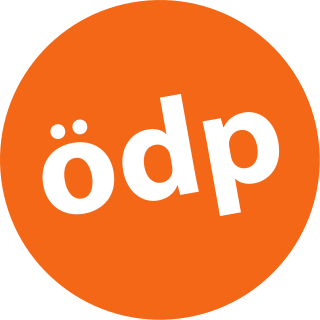
The Ecological Democratic Party is a conservative and ecologist minor party in Germany. The ÖDP was founded in 1982.

The South Schleswig Voters' Association is a regionalist political party in Schleswig-Holstein in northern Germany. The party represents the Danish and Frisian minorities of the state.

Die Partei für Arbeit, Rechtsstaat, Tierschutz, Elitenförderung und basisdemokratische Initiative, or Die PARTEI, is a German political party. It was founded in 2004 by the editors of the German satirical magazine Titanic. It is led by Martin Sonneborn. In the 2014 European Parliament election, the party won a seat, marking the first time that a satirical party has won a seat to the European Parliament. With the 2019 European Parliament election, the party gained a second seat, held by Nico Semsrott.

The Communist Party of Germany is an anti-revisionist Marxist-Leninist communist party in Germany. It is one of several parties which claim the KPD name and/or legacy. It was founded in Berlin in 1990. The party is also commonly referred to by the name KPD-Ost to differentiate it from other parties with the same name, most prominently the historical Communist Party of Germany.

The Left, commonly referred to as the Left Party, is a democratic socialist political party in Germany. The party was founded in 2007 as the result of the merger of the Party of Democratic Socialism (PDS) and Labour and Social Justice – The Electoral Alternative. Through the PDS, the party is the direct descendant of the Marxist–Leninist ruling party of former East Germany, that being the Socialist Unity Party of Germany (SED). Since 2022, The Left's co-chairpersons have been Janine Wissler and Martin Schirdewan. The party holds 28 seats out of 736 in the Bundestag, the federal legislature of Germany, having won 4.9% of votes cast in the 2021 German federal election. Its parliamentary group is the smallest of six in the Bundestag, and is headed by parliamentary co-leaders Heidi Reichinnek and Sören Pellmann.
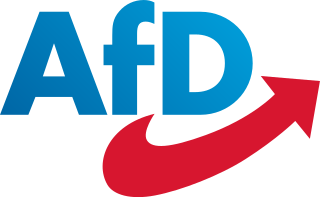
Alternative for Germany is a right-wing populist political party in Germany. AfD is known for its Euroscepticism, as well as for opposing immigration to Germany. As a right-wing party, AfD is commonly positioned on the radical right, a subset of the far-right, within the family of European political parties that does not oppose democracy.
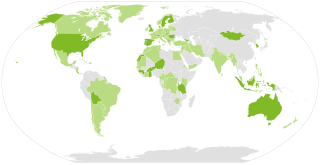
The Progressive Alliance (PA) is a political international of progressive and social democratic political parties and organisations founded on 22 May 2013 in Leipzig, Germany. The alliance was formed as an alternative to the existing Socialist International, of which many of its member parties are former or current members. The Progressive Alliance claims 140 participants from around the world.
The Party for Biomedical Rejuvenation Research, formerly the Party for Health Research, is a single-issue political party in Germany that seeks to accelerate the development of medicine to reverse the aging process.

The Party of Humanists is a minor political party in Germany that first participated in the 2017 federal election.
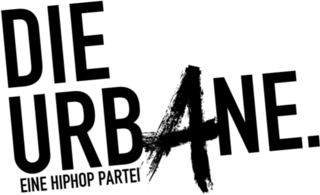
Die Urbane. Eine HipHop Partei is a German political party founded in Berlin in February 2017 which locate themselves within the hip hop culture. The main goals of the party include first and foremost social justice; their self-proclaimed goal is to achieve equality among all citizens. In this context, the party supports the introduction of a universal basic income.

The III. Path or The Third Path is a far-right and neo-Nazi political party in Germany.

Der Flügel is a far-right faction within Germany's Alternative for Germany, a right-wing populist opposition party. The group was led by Björn Höcke and Andreas Kalbitz. Approximately 20 percent of AfD members are organized also in the "Flügel". Following the request by the AfD executive board to dissolve Der Flügel by the end of April 2020, the group's online presence went offline. The Office for the Protection of the Constitution (BfV) has no reliable knowledge of an actual dissolution. Within the party, Der Flügel now calls itself the "social-patriotic faction".
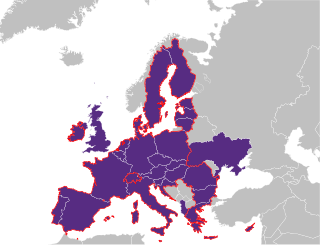
Volt Germany is a social-liberal pro-European, eurofederalist political party in Germany. It is the German branch of Volt Europa, a political movement that operates on a European level.
Klimaliste is the name of various microparties and voter groups in Germany that advocate climate protection measures to meet the 1.5 °C IPCC and Paris Agreement warming limit target. They see themselves as a grassroots movement.

Volt Luxembourg is a political party in Luxembourg. It is an internal section of Volt Europa and was founded in 2018. It received 2.11% of the vote in the 2019 European elections, which meant that the party did not win a mandate.

















